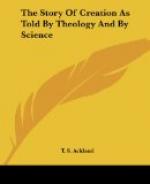Whether or not we assume the theory of development to be wholly or partially correct in reference to the lower animals, we must admit that it is true of man, but in a sense totally different from that which Mr. Darwin suggests. The development of which he is the advocate is a development of race, in which the advance made by each individual generation is exceedingly small, while the difference in remote generations, the accumulated advance of successive generations, is great. In man, on the contrary, there is no reason whatever to believe that there has been any advance at all in the race from the very earliest periods—that either in physical power or intellectual ability the present generation of men, taken as a whole, are in any way superior to their most remote ancestors. The development of which man is especially capable is the development of the individual, that development being not physical, but intellectual and moral, and being in a great degree dependent on the will and perseverance of the individual, and very little on external circumstances. The result of these individual developments has been the accumulation of a vast fund of wealth, useful arts, sciences, literature, which form the common possession of the whole race, but do not necessarily imply the slightest advance in any particular individual—that advance being dependent, not on the possession of those treasures, but on the use made of them. In the case of man then development does certainly exist, but it takes a line totally distinct from that which Mr. Darwin advocates, and thus forms another broad line of demarcation between man and the most advanced of the lower animals.
It appears then that the faculties of man differ generically from those of the animals. A new order of things seems to have commenced with the appearance of man on the earth—an order in which the highest place was to be maintained by intellectual instead of physical power. No mere process of evolution then will account for man’s origin. His physical nature may have been formed in that way; but we cannot believe that his intellectual and moral nature were developed from any lower creatures. Only some special Creative interference can account for his existence.
So far then as it tends to negative the continued operation of the Creator, the theory of evolution is untenable. Like that of Laplace, it fails to give an adequate cause for existing phenomena. But it seems probable, as will be seen in the next chapter, that both theories have in them much of truth. They cannot point out the cause of the universe, but they may give us a more or less accurate view of the manner in which that cause operated. The facts brought forward by geologists have been shown not to be incompatible with interpretations which the Mosaic Record readily admits, though they conflict with existing notions upon certain points. In no one then of the three sciences which have been supposed to be specially antagonistic to that record, is there anything to be found which can be maintained as a reasonable ground for doubting that that record is, what it has always been held to be by the Church, a direct Revelation from the Creator.




